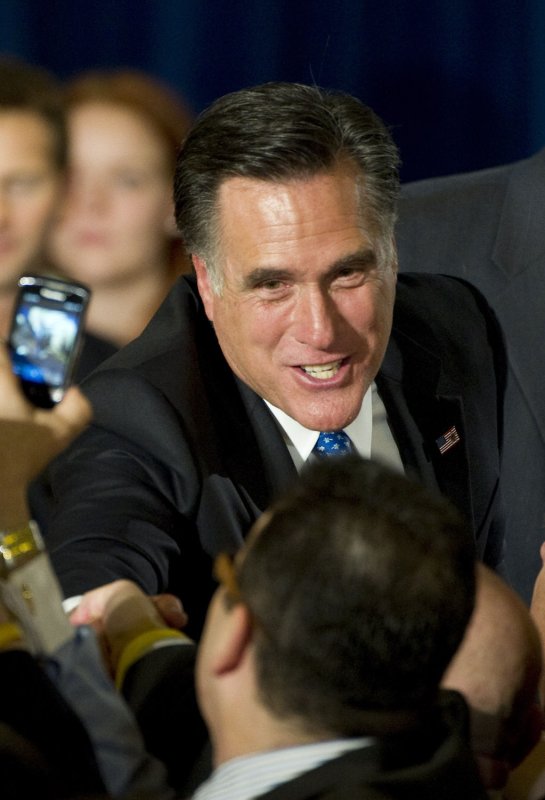Republican presidential hopeful Mitt Romney goes into the New Hampshire as the odds-on favorite but if any of his rivals can inch closer he may be in trouble down the road. UPI/Brian Kersey |
License Photo
The first-in-the-nation caucuses in Iowa last week yield to the first-in-the-nation primary Tuesday in New Hampshire.
Last week's Iowa caucuses -- in which former Massachusetts Gov. Mitt Romney and former U.S. Sen. Rick Santorum of Pennsylvania were in a virtual tie as the favorite of Republican caucus-goers -- winnowed the field when U.S. Rep. Michele Bachmann announced she was ending her bid to be the party's nominee.
Several national polls indicate Romney, who collected eight votes more than Santorum in Iowa, is expected to win handily in New Hampshire, where he has a summer home.
Still, the win in Iowa and an endorsement from Sen. John McCain of Arizona, Romney's 2008 rival and eventual GOP presidential nominee, didn't provide a big bounce for Romney in New Hampshire, a Suffolk University two-day tracking poll released Thursday indicated.
While still holding a commanding lead with 41 percent of likely voters in Tuesday's Republican presidential primary, the poll indicated Romney lost 2 percentage points from a Suffolk poll a few days earlier. Pollsters said it was the first time in four daily tracking polls that Romney dropped below 43 percent.
Romney was followed by U.S. Rep. Ron Paul of Texas with 18 percent, who jumped 4 percentage points, and Santorum, with 8 percent, up 2 percentage points and has shown increases for three straight days, results indicated.
Former House Speaker Newt Gingrich, with 7 percent, dropped into fourth place and a tie with former Utah Gov. Jon Huntsman, who bypassed the Iowa caucuses to focus on New Hampshire. Bachmann, Texas Gov. Rick Perry and former Louisiana Gov. Buddy Roemer combined for just 2 percent and 17 percent were undecided.
Wednesday was "the first full day that voters had the opportunity to digest the final results of the Iowa caucuses," said David Paleologos, director of the Suffolk University Political Research Center in Boston. "The result is that the same three winners in Iowa are the top three contenders in New Hampshire."
Despite skipping the caucuses, Huntsman picked up 1 percent of the vote in Iowa for a dead-last finish. In a post-caucus interview with MSNBC, Huntsman called the results "unbelievably ambiguous."
"I've got to tell you, coming out of Iowa, it was unbelievably ambiguous," the former Utah governor told MSNBC. "I mean to think that Gov. Romney with his team on the ground for what? Six years now? Basically [Romney] did no better than he did last time [in 2008]; you've got three people basically sharing a tie."
Huntsman told MSNBC he likes his chances in New Hampshire, despite what the polls indicate.
"I like our position. We've put in the grassroots work," he said. "Last night in Peterborough, we celebrated event No. 150. The 150th public event for the Huntsman campaign, and I can feel a surge of energy on the ground. And I think we're in great shape here."
Huntsman, a former ambassador to China for President Obama, told MSNBC he is the only viable alternative to Romney.
"Everybody wants an alternative," Huntsman said. "Let's face it, they want competition in the marketplace. And they are still looking for that key alternative."
Huntsman says Iowa was key to shrinking the field but New Hampshire will determine the candidates' electability in a race against an "establishment" -- read Romney -- candidate.
With his squeaker win in Iowa and if Romney wins in the Granite State as expected, he will be the first non-incumbent Republican to do so in modern presidential history.
With Romney's seeming lock on New Hampshire some candidates, such as Texas Gov. Rick Perry, have opted to downplay a visit to the New England state when South Carolina -- a state not too friendly to Romney -- has primary Jan. 21.
"If the others don't slow him up here, they risk him getting some real momentum," said Tom Rath, a veteran New Hampshire operative helping Romney in the state, told The Washington Post recently. "Equally, New Hampshire's reputation for being quirky and unpredictable and volatile argues that funny things can happen here at the end and you want to be around in case we spring a leak."
Mike Dennehy, who ran Republican U.S. Sen. John McCain's successful 2008 campaign in New Hampshire but so far hasn't aligned with any current candidates, says campaigning in New Hampshire is a smart play despite Romney's lead.
"Given [Romney's] now-20 point lead, if another candidate can get something going and come in only 10 points behind, then that person should have some steam headed out of New Hampshire to South Carolina," Dennehy told the Post. "Second place ends up being the gold for the New Hampshire primary this year."
But Romney's campaign isn't taking anything for granted in New Hampshire, where many voters said they think the primary is his to lose.
New Hampshire Republicans "have a real tendency to pick the next person in line," Andrew Smith, director of the University of New Hampshire Survey Center, told the Los Angeles Times just after the Iowa caucuses.
"He is a more focused candidate; he's focusing on the right issue; he's got the best organization of any candidate in the state … and on top of that he fits in with the New Hampshire electorate, which is largely a moderate Republican electorate," Smith said. "All of those things together put him in charge."
But Romney's state campaign say they're operating with the principle every person's vote must be earned, not expected, pointing to 2008, when polls indicated the bulk of voters didn't make up their minds about whom to support until less than a week before the primary.















